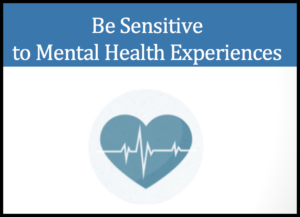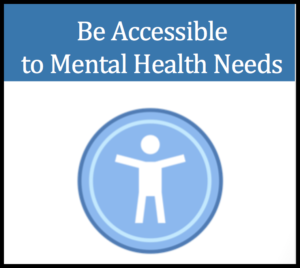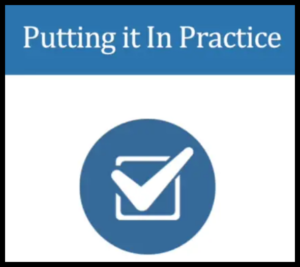
The Mental Illness in Dispute Resolution (MIDR) course teaches dispute resolvers to be sensitive, impartial, and accessible to parties with mental health concerns.
An overview of the 3 modules and some testimonials is presented below.
Program Overview

A: Be Sensitive and Impartial Toward Mental Health Issues (60 min)
Understand the definitions of mental health and mental illness, the prevalence of mental health problems, and the best language to use when discussing mental health conditions. Appreciate the choices, perspectives, and experiences of people living with mental health conditions, supporters, and mental health professionals. Receive tools and guidance of ways to be impartial across the diverse viewpoints in mental health.
Components
- Lecture: The Voices and Choices in Mental Health
- Exercise: The “Right” Choice for Treatment
- Case Study: Is This A Problem?
- Takeaway Tool: Validating Mental Health Perspectives Checklist
Past trainees say…
- “The training kept my attention.”
- “The session is a valuable tool to affectively prepare and respond to individual and organizational MH beliefs and cultures that “silently” impact the process of mediation.”
- “The self-assessment tool is a ‘keeper’”

B: Become Accessible to Mental Health Needs (60 min)
Learn about universal design to create accessible processes that work for people of diverse abilities. Apply the seven key principles of universal design to make your practice accessible to parties with mental health needs.
Components
- Lecture: Principles for Accessible Mediation Practice
- Exercise: Make The Session Work
- Case Study:: Adjusting the Session to Meet Party Needs
- Takeaway Tool: Accessible ADR Practices Worksheet
Past trainees say…
- “The session provided additional resources to help move from accommodation to accessibility when scheduling and delivering services.”
- “I enjoyed this session very much.”

C: Put it in Practice: Impartiality and Accessibility (30 min)
Apply the lessons from the previous modules to intake, opening statement, session guidelines, drafting agreements, dealing with challenging behaviors, and responding when mental health needs come up during cases (disclosure, accusations, suspicions, or the facts of the case).
Components
- Lecture: Incorporating These Principles Into Intake and Sessions
- Case Study: Applying These Principles to Your Practice
- Takeaway Tool: Sample Session Guidelines and Opening Statement
Past trainees say…
- “You exceeded my expectations — your delivery style is on point.”
Purchase Below
Create a user name and password.
Terms
- License lasts a year with an option to renew – for your personal use only
- In the unlikely event that there are technical difficulties creating service interruptions, you can report this to MH Mediate to extend the license by any missing time. This has never happened yet.
- MH Mediate does not assume responsibility for mitigating technical issues that arise from your organization’s technology or any individual user’s technology. Notwithstanding, we’ll do what we can to help troubleshoot any issues. So far all users have been able to access our programs.
- MH Mediate reserves the right to change service providers for online training hosting and video delivery.
